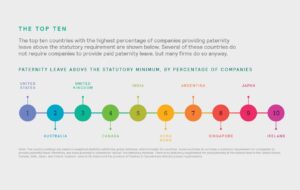Global parental leave policies reflecting societal changes
- 3 Min Read
Organisations around the world are adapting to the changing roles and types of families by expanding and developing parental leave policies.
- Author: Owain Thomas
- Date published: Aug 24, 2016
- Categories

Organisations around the world are adapting to the changing roles and types of families by expanding and developing parental leave policies.
While the majority of global firms still define maternity and paternity around traditional gender roles, there is a sizeable and growing minority of employers who are removing established boundaries.
However, according to Mercer’s Global Parental Leave report, only one third of multinational firms have a centralised global policy covering all types of parental leave.
“With evolving gender roles and defining families to include same-sex parents, many organisations are modifying their parental leave programmes to accommodate their changing workforce,” said Mercer president of talent and senior partner Ilya Bonic.
“Additionally, some employers are even expanding their policies beyond mandates since leave is becoming a valuable tool for finding and keeping the best talent and promoting equality.”
Taking action
Modernising and reforming parental leave policies has been identified as a substantial action which employers can take to begin reducing the gender pay gap.
The Mercer report highlighted that although two-thirds (64%) of companies worldwide provided maternity leave for only the birth mother, a quarter (24%) of companies opened this leave to the primary caregiver — regardless of gender.
This approach is even more common where paternity or secondary caregiver leave is concerned.
One third of firms allowed this leave birth father or secondary caregiver, regardless of gender, while only just over half (54%) restricted it to the birth father only.
Moreover, 38% provided paid paternity leave above the statutory minimum while several countries mandated a parental leave programme that may be used by either parent.
Where do EU fathers get the most paternity leave?
National differences
 There were significant differences across the world in terms of companies willing to offer more than the statutory minimum paternity leave.
There were significant differences across the world in terms of companies willing to offer more than the statutory minimum paternity leave.
Although the Americas was the lowest within this comparison, the United States (1st), Canada (4th) and Argentina (7th) were in the top ten countries for firms offering above the legal minimum.
Australia, the UK and India completed the top five. It should be noted that several countries do not have a legal minimum for this.
Shared parental leave and higher qualifications to drive polarised labour market changes
Attitude shift
 It appears from the research that attitudes towards employees taking paternity leave are also shifting.
It appears from the research that attitudes towards employees taking paternity leave are also shifting.
It is not inconceivable that soon the majority of global organisations will openly encourage their employees to take paternity leave, have most of their eligible employees use their statutory paternity leave, and have most employees also use the additional company-provided days.
“Parental leave policies can have a positive effect on both employees and employers – they help the workforce maintain a better work-life balance, especially the younger generation, and they promote the company as a more attractive place to work, improving retention during a time of continued demand for highly-skilled talent,” Bonic continued.
He added that many firms were considering adopting global approaches to parental leave despite the significant legislative and administrative complexity involved.
“Some compelling reasons – like no longer adhering to requirements that are not compatible with diversity and equity strategies and creating a level playing field for employees in all countries – have prompted companies to consider a global policy,” he added.





